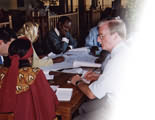![]() University | Search |
News |
A-Z Index | Contact
Us
University | Search |
News |
A-Z Index | Contact
Us

|
|
||||
|
|
||||
Centre for the study of Education in an International Context (CEIC)INTERCOM ARCHIVE |
||||
|
This page ... Related pages ... CEIC Homepage
Meet CEIC Links
|
The intent looks and feelings of expectancy as to what the school day
holds are easy to recognise as the students of SOS Hermann Gmeiner International
College, Ghana do their daily trek from the boarding hostels to the college.
Comprising 221 students from 13 African countries, an Asian and a European
country, the College offers the International General Certificate of Secondary
Education and the International Baccalaureate programmes complemented
with a number of extra-curricular activities. These range from Literacy
Programmes in neighbouring communities, Environmental Initiatives through
Arts and Crafts to the acquisition of skills like filming. Like all International
Schools, the gains we would like to make in individual students are an
acquisition of a body of enduring values, attitudes and practices. The task is not easy as one would well imagine. It means winning the hearts and minds of young people and they in turn, having the conviction to positively affect their immediate environment with these ideals when they have left their sheltered confines into the wider world. It also means that as Educators we should have first subscribed to and endorsed these ideals. REALISING GOALSThe single-mindedness needed to achieve a goal is well-illustrated through some of the features of the International Economic Community. Like our mission statements which spell out the need for international understanding and cooperation among students of different nationalities, the global economic actors have aims such as increased output, economic growth and social development just to mention a few. The growing interdependence amongst nations, successful regional cooperation and integration and harmonisation of economic systems are some of the ways in which they are achieving these goals. Never mind the other side of the argument; the inspiration we could draw from them, as international schools, is their organisational abilities and their relentless drive to find better ways of realising these goals. An important development in the annals of the international school community which could quicken the pace of the proselytising march in these schools is the Education for Peace document (yet to be adopted by the IESPP schools) thought out by a group of International Educators in July 1997 at the University of Bath. The highlights of the draft document include a set of guiding principles, students' involvement in conflict resolution activities and community service and chosen themes across the curriculum which would stimulate the habit of peace if pursued. Also, there is an emphasis on thinking and communication skills already recommended in the performance criteria of some programmes in the Humanities and Languages. These would provide the impetus for developing and carrying out peace-related ideas and actions. One area where teachers are asked to explore in the Education for Peace working draft is what I have referred to as 'chosen themes'. Cultural Diversity is one of such topics and the latitude of issues suggested included identity, contributions of culture to world heritage and factors affecting cultural influence. The Arts, Languages and Humanities teachers would be able to tackle this from any angle as it comes up in their content. Indeed, the very nature of the international school provides an ideal setting that gives meaning to a topic like this and begins to equip students with the desired attitudes to strangers, for instance. The practice of service to the community, also emphasised by the International Baccalaureate programme, is that element in International Education which affords students the opportunity to give something back to their communities and, as students' CAS diaries reveal, it is an opportunity to understand and empathise with the members of their community and, more importantly, the willingness with which they give of themselves during such sessions. I would want to believe that the students who we teach and work with in international schools are intelligent, independent-minded and open to reason. In SOS Hermann Gmeiner International College, for example, the typical student is amenable and open-minded which means cooperation, understanding, empathy in relation to other cultures and the development of the habit of peace is within reach. What is more, teachers have a wealth of critical ability and international exposure through workshops and conferences which ably equips them for the task for making an impact on their students. As we confront the next millennium, International Educators should devise
more creative ways at all levels of school life that will facilitate and
bring into reality the noble ideas contained in our mission statements.
The skills and resources we possess as a corporate international body
should enable us turn the rest of our straw into gold.
|
More
About ... |
||
|
|
|
|